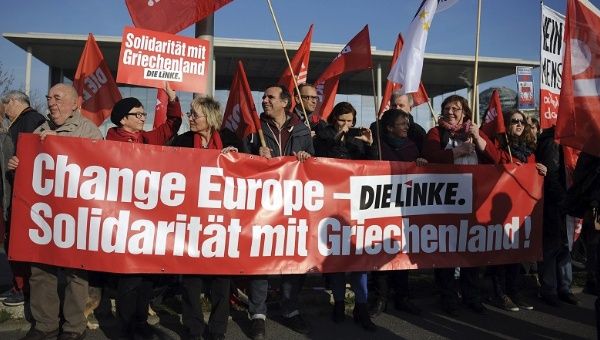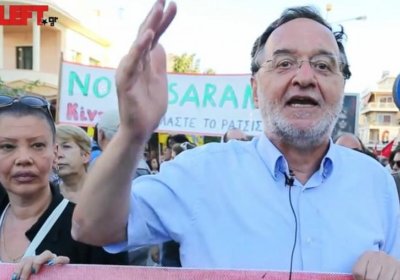 30,000 people marched in Vienna on August 31 to demonstrate against inhumane treatment of refugees.
In less than a fortnight a series of tragedies took place on the borders of Europe, spurring a continent-wide debate over refugee policy.
On August 26, about 200 refugees perished at sea as their ship capsized off the coast of Libya on its way to Italy.
30,000 people marched in Vienna on August 31 to demonstrate against inhumane treatment of refugees.
In less than a fortnight a series of tragedies took place on the borders of Europe, spurring a continent-wide debate over refugee policy.
On August 26, about 200 refugees perished at sea as their ship capsized off the coast of Libya on its way to Italy.
Greece
 30,000 people marched in Vienna on August 31 to demonstrate against inhumane treatment of refugees.
In less than a fortnight a series of tragedies took place on the borders of Europe, spurring a continent-wide debate over refugee policy.
On August 26, about 200 refugees perished at sea as their ship capsized off the coast of Libya on its way to Italy.
30,000 people marched in Vienna on August 31 to demonstrate against inhumane treatment of refugees.
In less than a fortnight a series of tragedies took place on the borders of Europe, spurring a continent-wide debate over refugee policy.
On August 26, about 200 refugees perished at sea as their ship capsized off the coast of Libya on its way to Italy.
 Syrian refugees on Greece-Macedonia border. Photo: Amnesty International.
“Are we animals? Why? Why?”
Those were the words of one Syrian refugee to BBC's Channel 4 recently after Macedonian police attacked desperate families seeking entry into the country along the border with Greece.
The refugee crisis has grown to immense proportions. Tens of thousands of people have flooded into the Balkans in recent weeks.
Macedonia
Syrian refugees on Greece-Macedonia border. Photo: Amnesty International.
“Are we animals? Why? Why?”
Those were the words of one Syrian refugee to BBC's Channel 4 recently after Macedonian police attacked desperate families seeking entry into the country along the border with Greece.
The refugee crisis has grown to immense proportions. Tens of thousands of people have flooded into the Balkans in recent weeks.
Macedonia
Fifty-three members out of SYRIZA's 201-strong central committee, have resigned on August 26 in protest at the new bail-out deal SYRIZA signed that agrees to the type of brutal austerity measures SYRIZA was elected in January to oppose, Enikos.gr said that day.
Most have joined the Popular Unity movement, supported by former members of SYRIZA's Left Platform that will run on an anti-austerity platform in new elections called when SYRIZA Prime Minister Alexis Tsipras resigned recently.
BRISBANE
Come to a Red Cinema screening of Pride on Friday August 28 at 6pm at the Activist Centre, 74b Wickham St, Fortitude Valley with special guest, Bob Carnegie, Queensland secretary of the Maritime Union of Australia.
The film portrays the inspirational true story of the rainbow community’s solidarity with the miners’ strike in Britain under Margaret Thatcher.
MELBOURNE
Greek Prime Minister Alexis Tsipras announced Thursday that he will step down and call snap elections for September 20, after facing strong resistance from within his own SYRIZA party.
“I will ask the Greek people if they think we have made achievements,” said the prime minister. “You will decide how we will recuperate the Greek economy, with your vote you will decide the future of Greece.”
By any logic, Greece's SYRIZA-led government should be sinking in the opinion polls.
At the Brussels Eurosummit of Eurozone leaders on July 12, SYRIZA Prime Minister Alexis Tsipras agreed to a set of draconian preconditions for obtaining a third €86 billion bailout. The decision effectively reversed the opposition to austerity on which SYRIZA was elected in January.
The International Monetary Fund (IMF) has decided not to sign off on the European Union's bailout deal with Greece, saying it does not specifically address tackling Greece's debt, TeleSUR English said on July 30.
In a meeting on July 29, the IMF board members said they “cannot reach staff level agreement at this stage” over whether to support Greece's bailout package, according to the Financial Times who received the confidential meeting minutes.
In the aftermath of the harsh deal for brutal austerity and mass privatisation imposed on Greece in the early hours of July 13, both Berlin and Paris are floating alternative “solutions” to the euro problem.
Germany, on the one hand, wants greater fiscal integration, whereas France is calling for the creation of a eurozone government as well as a dedicated finance minister.
The mainstream press is talking up the divisions between the two nations as fundamentally different perspectives on the euro — or even differences in political “culture”.
An event of profound importance took place in Brussels on July 12. The significance of the European summit negotiations extends well beyond the immediate — and devastating — consequences for the people of Greece.
The fallout will not just affect the stability of the Greek government and the political future of SYRIZA and Prime Minister Alexis Tsipras.
 The Greek parliament passed a second bill on July 23 including measures needed for Greece to open negotiations over the eurozone's bailout package of 86 billion euros, TeleSUR English said that day.
The Greek parliament passed a second bill on July 23 including measures needed for Greece to open negotiations over the eurozone's bailout package of 86 billion euros, TeleSUR English said that day.
 Supporters of Die Linke (The Left) demonstrate in front of the Federal Chancellery, Berlin.
Protests took place in 14 cities in Germany on July 16 against the German government’s aggressive treatment of the Greek crisis and in solidarity with their European Mediterranean neighbours.
Supporters of Die Linke (The Left) demonstrate in front of the Federal Chancellery, Berlin.
Protests took place in 14 cities in Germany on July 16 against the German government’s aggressive treatment of the Greek crisis and in solidarity with their European Mediterranean neighbours.
Thousands of people protested on July 15 across Europe – and in cities around the world – in solidarity with Greece's struggle against austerity.
The next day, Marina Prentoulis, spokesperson for Syriza in Britain, told TeleSUR that what was needed was a “pan-European movement” capable of confronting the power of European capital and the neoliberal agenda of European leaders.
- Previous page
- Page 3
- Next page







